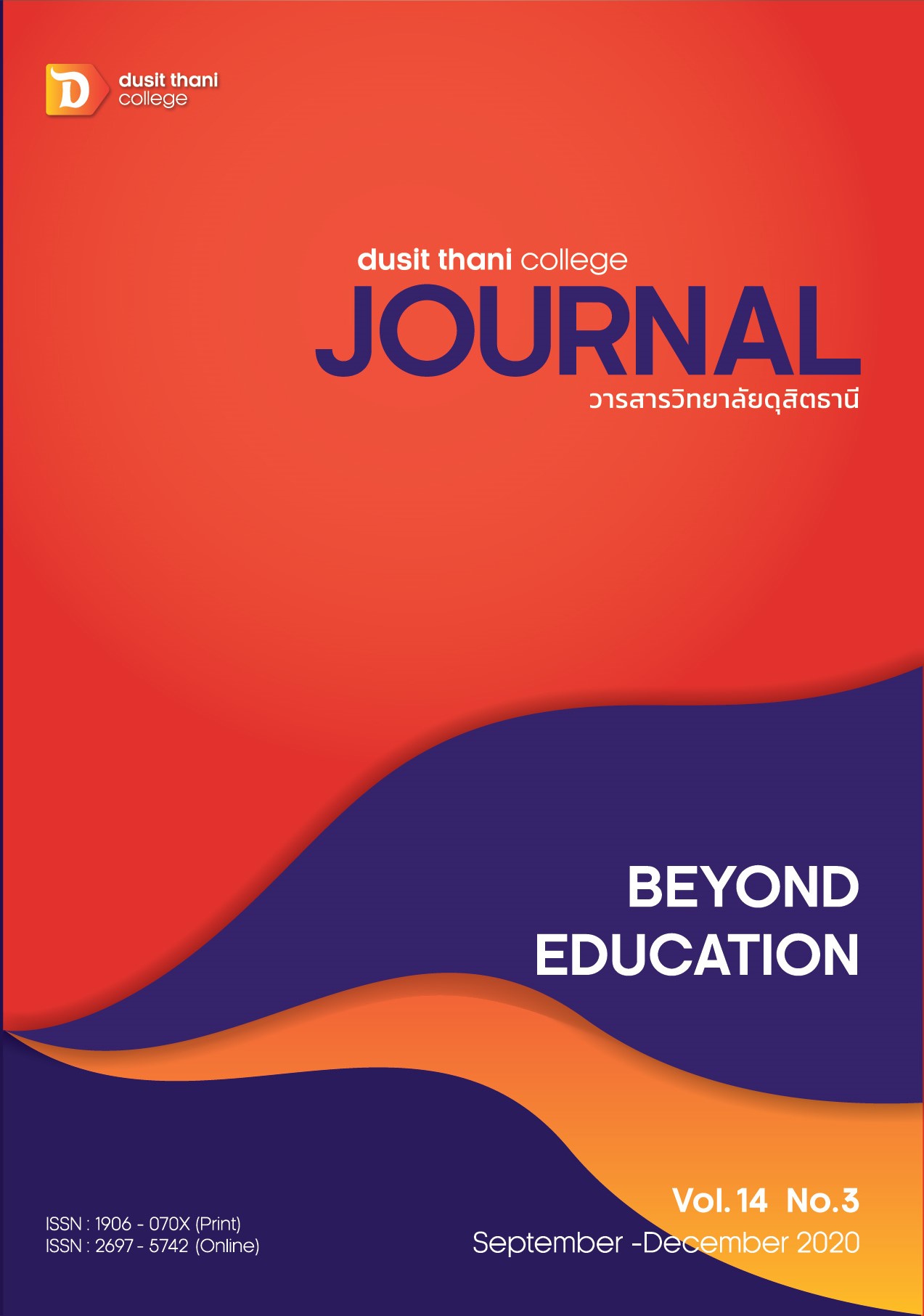Guideline of Sustainable Ecotourism Management by Applying Geographic Information System for Strategic Planning
Main Article Content
Abstract
Tourism industry has been recognized as an apparatus of economic development for instances, the rise of employment rate, the amount of investments, and the enormous consumption over tourism and tourism-related industries, all of these aspects (just to mentioned a few) have been unexpectedly expanded. However, a guideline of tourism was not static, it was a fixable pattern along with circumstance included, internal and external environment in the particular state. This has been reflecting to the stability of a paradigm of tourism, it exists as an unstable pattern. Hence, a group of tourism entrepreneurs would have to adapt and to prepare themselves continuously in order to help adjusting their strategic management effectively. These strategy itself has been influenced by the dynamic of the world which needed to be in concern with cutting-edge technology. Entrepreneurs have to apply related IT/IS that meant for more competitive advantages. Nowadays, Geographic Information System was accepted as an important component for a strategic planning. Thus, this article aims to acknowledge and demonstrate dimensions of GIS implementation for a strategic planning of Sustainable Tourism Paradigm.
Article Details
Article Screening Policy
- All research and academic articles to be published must be considered and screened by three peer reviews in the relevant field / article.
- All articles, texts, illustrations and tables published in the journal are the personal opinions of the authors. Editors don't always have to agree. And no responsibility whatsoever is the sole responsibility of the author.
- The articles to be published must never be published. Where did you first publish? And not in the consideration of other journals If the audit found that there has been a duplicate publication It is the sole responsibility of the author.
- Any article that the reader sees as being plagiarized or impersonated without reference. Or mislead the work of the author Please let the journal editor know it will be your greatest blessing.
References
Boer, B. (1993). Ecotourism and sustainable development: The international and national legal framework. In Proceeding of ‘Law Asia 93’ Asia on the Leap – The Role of Law. Colombo, Sri Lanka, 12-16 September, 121-127.
Britton, S. (1982). International tourism and multinational corporations in the Pacific: The case of Fiji”, in The Geography of Multinationals Eds Taylor, M, Thrift, N (Croom Helm, Andover, Hants: 252–274
Buckley, R. (1994). A framework for ecotourism. Annals of tourism research. 21(3): 661-665.
Burrought, P.A. & McDonnelie, R.A. (1998). Principles of Geographical Information Systems.
New York: Oxford University Press.
Christ, C. (1998). Taking ecotourism to the next level. A look at private sector involvement with local communities. Ecotourism: a guide for planners and managers.183-195.
Department of Trade Negotiations. (2011). AEC Fact book, One Vision, One Identity,
One Community (1st ed.). Bangkok: Department of Trade Negotiations.
Huxhold, W.E. (1995). Managing Geographic Information System Projects (Spatial Information System). Oxford: Oxford University Press.
Ingkakul, Suraphee. (2005). Remote Sensing Analysis. Bangkok: Chulalongkorn University Press.
Jirakhajornkul, Petch. (2006). GIS and The Use of ArcGIS Desktop: Version 9.1. Bangkok: Thammasat University (Rangsit Camous) Press.
Kasikorn Research Center. (2018). Tourism Economic Trend of 2018. Retrieved July 27, 2018, from http://ttaa.or.th/wp-content/uploads/2017/09/เศรษฐกิจการท่องเที่ยว18012561.pdf
Kessamlee, Pongsathorn. (1987). Does The Development of Tourism Affect The Environment? TAT Review Magazine. 6: 11-15.
Nirattrakul, Yuwadee. (1996). Eco-tourism. Journal of Continuing Resources Khon Kaen University. 4(1): 43-48
Pongleerat Saravut. (2010). Application of Geographic Information Systems For Planning and Feedback of Public Participation in City Plan Implementation and Framework, Chiangmai (3rd Ed.). FEU Academic Review. 3(2): 57-62.
Pongroop, Thasadinee. (2007). The Study of Factors Classified Eco-Tourism District of National Park Case Study: High Potential National Park (Published Master’s Thesis). Srinakharinwirot University.
Seangpikul Assavin. (2002). Eco-Tourism, Lampang Province. Suthiparithat Journal. 16(48): 98-108.
Sombatsri, Prapassorn. (2006). Eco-Tourism. Rajabhat Agriculture. 7(1): 73-83
Sujarit, Chatchai. (2011). Tourism Industry: A Main Factor For National Development. Uttaradit Rajabhat University Academic Journal. 2(2): 13-19
Thavornwachiradham Viratthaya. (2011). Evaluation of Potential, Problems, and Solutions on Application of Geographic Information Systems For Coastal Management: A Case Study of Sri Racha District, Chonburi Provine. (Published Master’s Thesis). Bangkok: Kasetsart University.
Thavornwachiradham Viratthaya. (2011). Participation in Community-Based Ecotourism Management: A Case Study of Kiriwong Community, Lansaka District, Nakhon Sri Thammart. (Published Master’s Thesis). Bangkok: Chulalongkorn University.
Tourism Authority of Thailand. (1997). The Study of Tourism For The Northern Ecosystem Protection. Bangkok: Tourism Authority of Thailand.
TYDAC. 1987. Spatial Analysis System Reference Guide. Ottawa: TYDAC Technologies Inc.
Udompaijit, Thamrong. (2000). The Roles of Private Development Sectors in Human Resources Development in Bangkok Slum Area. (Published Master’s Thesis). Chulalongkorn University.
United Nations, (1993) Earth Summit: Agenda 21: The United Nation Environment Program of Action from Rio. New York: Department of Public Information.
Wangpaijit, Seri. (1994). Thai Tourism to Sustainability. Bangkok: Tourism Authority of Thailand.
Yodmanee, Suwit. (1993). The Tourism Development and Eco View. The Journal of Natural Resources Conservation and Environmental Protection. 5: 2-4.


